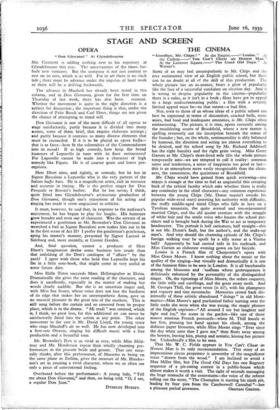THE CINEMA
" Goodbye, Mr. Chips ! " At the Empire. " Louise." At the Carlton.—" You Can't Cheat an Honest Man." At the Leicester Square.—" The Good Old Days." At Warner's.
SOME of us may feel unsympathetic to Mr. Chips and the rosy sentimental view of an English public school, but there
can be no doubt at all of the skill of this production. The whole picture has an as..urance, bears a glow of popularity like the face of a successful candidate on election day. And it is wrong to despise popularity in the cinema—popularity there is a value, as it isn't in a book ; films have got to appeal to a large undiscriminating public : a film with a severely limited appeal must be—to that extent—a bad film.
Nor, even to those of us whose ideas of a public school can best be expressed in terms of discomfort, cracked bells, stone stairs, bad food and inadequate amenities, is Mr. Chips often embarrassing. The picture, it is true, opens earnestly among the mouldering courts of Brookfield, where a new master is spelling reverently out the inscription beneath the statue of the founder ; but, on the whole, sentimentality is ably balanced by humour, the direction and acting are almost everything to be desired, and the school song by Mr. Richard Addinsell has the right banality and the right grim swing. Miss Greer Garson as Mr. Chips's short-lived wife lifts the whole picture temporarily into—we are tempted to call it reality: common sense and tenderness, a sense of happiness too good to last— this is an atmosphere more easily recognisable than the clean- ness, the earnestness, the quaintness of Brookfield.
Mr. Chips would have gained from quick reviewing—one enjoys it enough at the time to feel as ungrateful this creeping back of the critical faculty which asks whether there is really any continuity in the chief character—any common experience between the young Chips (Mr. Donat mustn't overdo his popular wide-eyed stare) asserting his authority with difficulty, the stuffy middle-aged timid Chips who falls in love on a Tyrolean mountain, the quite normal and too-rejuvenated married Chips, and the old quaint creature with the straggle of white hair and the senile voice who haunts the school pre- cincts and is brought back during the War to act as temporary headmaster. The portrait is half caricature, half straight—this is not Mr. Donat's fault, but the author's, and the make-up man's. And why should the charming episode of Mr. Chips's foreign walking tour be spoilt by a silly scene at a Vienna ball? Apparently he had carried tails in his rucksack, and Miss Garson an elaborate evening gown on her bicycle.
Louise is a French film of Charpentier's opera with Miss Grace Moore. I know nothing about the music or the quality of the singing—but visually and dramatically it is one of the funniest films to be seen in London. It is all bacchanalia among the blossoms and Ctualions whose grotesqueness is deliciously enhanced by the personality of the distinguished singer. Oh, the tiptoeings of Miss Moore, the sedate coquetry, the little trills and carollings, and the great stony teeth. And M. Georges Thill, the great tenor (is it?), with his plumpness and roguery and tiny moustache. Memories crowd back dis- jointedly of these artistic abandoned " doings " in old Mont- martre—Miss Moore's aged puritanical father turning over the little socks she wore when she was young, the magic phrases of the English captions—" All around I see but laughter and light and joy," the scene in the garden—like one of those mauve amorous French postcards—when M. Thill kneels at her feet, pressing her hand against his cheek, among the dubious paper blossoms, while Miss Moore sings "Ever since the day when unto thee I gave me," then floats away among the bowers, leaving him, plump and ecstatic, kissing her picture hat. Undoubtedly a film to be seen.
That Mr. W. C. Fields appears in You Can't Cheat an Honest Man is its only recommendation. This story of an impecunious circus proprietor is unworthy of the magnificent voice " drawn from the wood." I am inclined to avoid a Max Miller film, but The Good Old Days has one Regency sequence of a pie-eating contest in a public-house which almost makes it worth a visit. The sight of seconds massaging the huge stomachs of the contestants—the voice of the referee tolling out the score, "The Champion is starting his ninth pie, leading by four pies from the Camberwell Cannibal "—has






















































 Previous page
Previous page